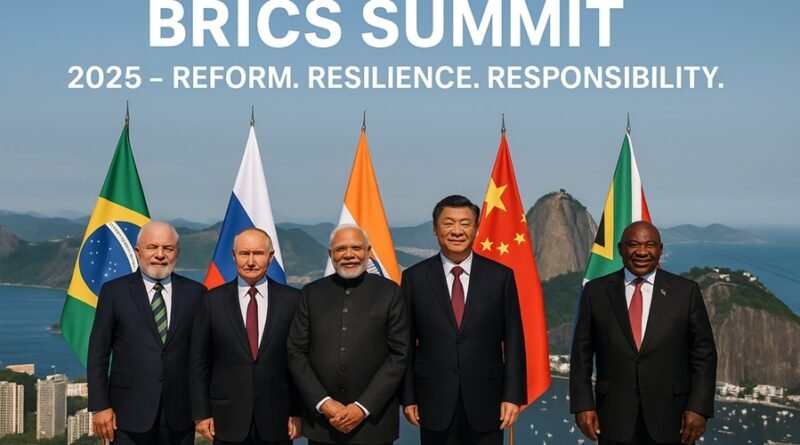BRICS Summit 2025: India Bats for Global South, Terror Reform, and Responsible AI in Rio de Janeiro
Overview: BRICS 17th Summit in Brazil
The 17th BRICS Summit, held from 6–7 July 2025 in Rio de Janeiro, Brazil, witnessed a pivotal moment in global diplomacy. Hosted by Brazilian President Luiz Inácio Lula da Silva, the summit gathered leaders of the five key emerging economies — Brazil, Russia, India, China, and South Africa — under the theme of reshaping global governance and fostering cooperation in the era of geopolitical volatility, AI advancement, and climate challenges.
Prime Minister Narendra Modi’s participation marked a strong reaffirmation of India’s commitment to the Global South, emphasizing reforms in outdated global institutions and advocating for decisive global action against terrorism.
Read This: BRICS Members and the BRICS Summit 2025: A New Era of Multipolar Global Cooperation
Reforming Global Governance: A Key Pillar of India’s Agenda
During the inaugural session on “Reform of Global Governance and Peace and Security”, PM Modi made a compelling case for the urgent overhaul of 20th-century institutions that govern today’s world. He argued that the UN Security Council, IMF, World Bank, and WTO are no longer equipped to deal with 21st-century crises and inequities.
Modi stressed:
“The institutions of global governance must reflect today’s multipolar world, not yesterday’s power dynamics.”
He thanked the BRICS leaders for including strong language on UNSC reforms in the Rio de Janeiro Declaration, indicating a collective push to democratize decision-making at the global level.
India’s stance reflected the aspirations of the developing world, which often finds itself underrepresented in international institutions despite bearing the brunt of global challenges like poverty, climate change, and resource conflict.
Terrorism and Security: No Room for Double Standards
In a powerful address, PM Modi drew attention to the Pahalgam terror attack of April 2025, calling it “an attack on the entire humanity.” He urged BRICS to adopt a zero-tolerance approach to terrorism, stating that those who fund, shelter, or glorify terrorists must be confronted and isolated globally.
His key points included:
- No double standards in dealing with terrorism.
- Call for harshest global actions against terror sponsors.
- Gratitude to BRICS for condemning Pahalgam in unequivocal terms.
This message was seen as a veiled reminder to countries like China, which have in the past blocked India’s attempts to list certain individuals as global terrorists in the UN Security Council. Modi’s direct and strong messaging placed India’s national security concerns at the heart of the BRICS agenda.
Conflicts and Diplomacy: India’s Balanced Global Stance
On the broader geopolitical landscape, Modi raised concern over conflicts in West Asia and Europe, stating:
“India has always championed dialogue and diplomacy… and we stand ready to contribute meaningfully to any peace effort.”
Amidst escalating global polarization due to the Russia-Ukraine war, instability in the Middle East, and rising tensions in East Asia, India’s call for a multipolar, inclusive global order resonates with many developing nations wary of picking sides in great-power rivalries.
Economic Multilateralism and AI: Toward a Sustainable Future
During the second session, “Strengthening Multilateral, Economic-Financial Affairs and Artificial Intelligence,” Modi emphasized the role of BRICS in the changing global economic architecture.
He stressed that diversity and multipolarity are strengths — not threats — in this fragile moment for globalization.
🧠 Four Key Proposals from PM Modi:
- BRICS New Development Bank (NDB) should follow a demand-driven, sustainable financing model for development projects.
- Proposal for a Science and Research Repository to assist Global South countries with access to innovation and knowledge.
- Urgent need to secure and strengthen the supply chain of critical minerals, which are vital to green technologies and digital industries.
- Push for a responsible and balanced approach to Artificial Intelligence, advocating AI governance along with promotion of innovation and fairness.
This AI-centric proposal gains significance as global institutions scramble to regulate emerging technologies. India’s call aligns with its own AI mission and regulatory ambitions, as well as the broader concerns of algorithmic bias, data privacy, and digital sovereignty.
The Rio de Janeiro Declaration: A Milestone Statement
The summit concluded with the unanimous adoption of the “Rio de Janeiro Declaration”, which captured the collective voice of BRICS on several issues:
- Commitment to reform global governance.
- Condemnation of terrorism in all its forms.
- Support for sustainable development and climate finance.
- Cooperation on AI, science, innovation, and digital transformation.
- Strengthening of the BRICS New Development Bank.
This declaration signals BRICS’ growing maturity as a bloc capable of presenting a coherent alternative to Western-dominated platforms like the G7 or OECD.
Analytical Insights: What Does It Mean for India and the World?
✅ India’s Gains:
- Reinforced leadership role among Global South nations.
- International support on terrorism and UNSC reform.
- Push for AI ethics and economic multilateralism.
- Strategic balancing between economic diplomacy and security narratives.
🔁 Implications for BRICS:
- Revitalized relevance in a fragmented global landscape.
- Potential eastward shift in global economic and tech ecosystems.
- Emerging as a platform for responsible innovation and inclusive growth.
🌎 Global Message:
The summit positions BRICS as a credible voice in shaping the post-pandemic world — one that seeks equity, peace, and innovation, not hegemonic control.
Suggested Articles
- Comparing BRICS and G7: A Comprehensive Analysis
- BRICS Expansion: A Transformative Move in Global Governance
- World’s Top Organizations: BRICS, G7, G20
- Top Countries with Highest Gold Reserves in 2025
- Petrodollar System Explained: Origin, Impact, and Future
Conclusion
The 17th BRICS Summit in Rio de Janeiro stands out not just for its symbolic solidarity, but for its substantive direction-setting in areas ranging from terrorism to technology. Prime Minister Modi’s interventions elevated India’s image as a mature, responsible, and assertive global actor, committed to inclusive development, peace diplomacy, and tech equity.
As geopolitical fault lines deepen, BRICS 2025 has rekindled hope for multipolarity, reform, and resilient cooperation — reminding the world that emerging powers are not just reacting to history, but shaping it.

